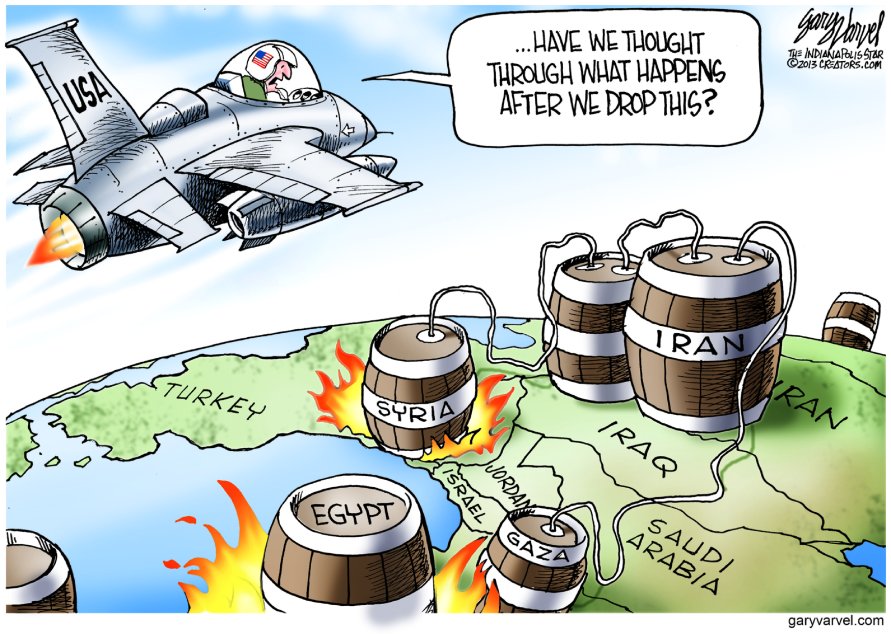Military Strike?! Then What?
All that they wish is to limit the American strike to one or two rocket raids on particular targets in Syria that will cripple the chemical — and maybe military — powers of the Syrian regime. It would be accompanied by the extension of Syrian opposition, whose weapons give them staying power in the face of the Syrian regime and its armed forces, without abandoning the strategy of a political solution.
Certainly Washington is aware of Moscow and Tehran’s opposition to this strike. However, for every American or international plan swept away, in the long- or short-term, by the ruling Syrian regime and its president, Putin holds a strong card at the negotiating table with Washington. He will not abandon his strong support of the Syrian regime unless he gets a meeting, just as Washington is prepared to provide for its interests to avoid a new military conflict in the Middle East. Thus, will the declaration of an American strike be a card played by the American president in his meeting with the Russian president or in the new “atmosphere of openness” in the American-Iranian relationship?
Some see in this American “production” a means to punish the Syrian regime merely as a tool or maneuver to put pressure on Damascus. As to the conditions set by Congress on this military intervention, they give the American president the option of a month or two before he starts firing his missiles at Syrian soil. That is enough of a period to undertake more of a diplomatic plan and secret negotiations between Washington, Moscow and Tehran, to persuade the parties of the conflict in Syria to accept some political solution. However, the true problem is that the popular intifada in Syria, unlike what happened in other Arab states, turned into a civil war in every sense of the word. There are 100 thousand victims, millions displaced or in refuge, cities and towns destroyed and grudges accumulated that give everyone a real fear of the so-called “post-Bashar” period.
The United States, in its decision to intervene in Syria, decided what it wants from the international community and what it alone is able to do. Its retreat from this intervention or this “strike” will touch America’s credibility and place, certainly damaging it significantly. However, more serious than this retreat is the extension of war and fighting from Syria to the neighboring Arab countries and to the Gulf, as the Syrian regime and its allies in the region threatened. We must not drop from our sight Israel and its interests regarding the Syrian regime, Israel’s impact on the American decisions, and Israel’s fear of the development in Damascus of a regime that is more threatening, more hostile, and more resistant to it.
Will the United States be satisfied with directing a painful blow at the Syrian regime? Or will America accompany the strike or follow it by arming the opposition and imposing other punishments against Syria? The proverb says, “The strike which does not break the victim turns back on those who undertake it.” They do not know even now if the American strike on the Syrian regime will be a fatal blow or just a painful one — just as they do not know the Russian and Iranian reactions to it.
Nearly a century has passed in Damascus and Mount Lebanon since the bloody sectarian events that France took as an excuse to send its fleets and its troops to the shores of Lebanon in a precursor to military intervention in Damascus … But the Sublime Porte [the Ottoman government] was faster than Paris. Fuad Pasha sent his foreign minister to Damascus, where he undertook to govern and execute a number of the instigators of the sectarian violence, which led to the restoration of security and peace in Syria and Lebanon. He stole from the French hands the pretext for military intervention in Damascus. That happened a century ago — when France and Britain were two big countries opposed to the Ottoman power of which Syria and Lebanon were subjects. As for today, the scales of power in the world have changed. The state of Israel has been established in the Middle East, which promotes its own safety over other American interests in the region. It has developed in international opinion a direct and indirect role over the governments of major countries.
The real question is not about the action or inaction of the United States to settle the question of whether to make “the strike” on the Syrian regime. Rather, the question is what will this strike affect in the course of the civil war: the weakening of the regime and furtherance of the opposition? What will be the Russian and Israeli responses? What will the Syrian regime do if the American strike causes a destabilization of the ground under it?
Everything shows that putting an end to the civil war in Syria starts and ends in Damascus. As for the foreign intervention, it helps, but it will not resolve the situation unless there is complete military occupation … And no one wants that in Syria, around Syria or among the major countries.

